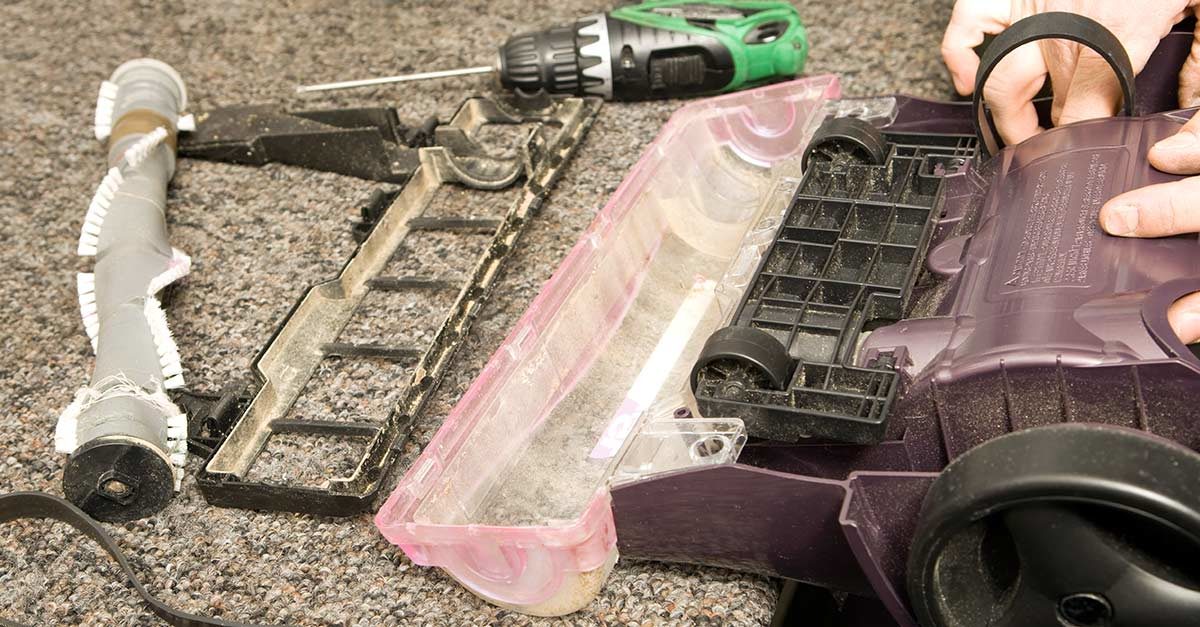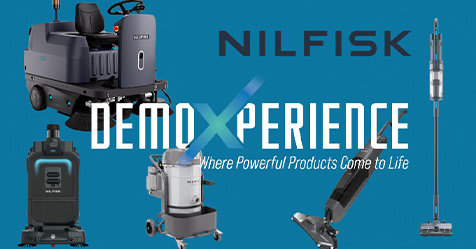Thrifty building service contractors (BSCs) and facility managers are always looking for ways to save money. One way to potentially cut expenses is to better maintain and even perform light repairs on the cleaning equipment they use every day—specifically, vacuum cleaners and automatic floor machines. Fortunately, vacuum cleaners and floor machines are more dependable and durable today than those made in the past. However, they do have moving parts and they tend to get a lot of use—and abuse—by cleaning crews, which means eventually they will need some attention and repair. Some repairs you can do yourself, which will help you save a few bucks. Others will require taking the machine back to your distributor’s repair shop. But some of these tips may postpone those repair shop visits and their costs.
Floor Machines
When one building service contractor first started his business, he purchased a used 175-rpm “buffer” floor machine. Twenty years later, he still had the machine, and it had never once seen the inside of a service repair shop. With proper care, including storage in a clean and dry area, a buffer can provide years of service. However, most BSCs and managers should expect a buffer to last about 10 to 15 years and to need some repair work during that time. For the most part, these are hardy machines, although the motor may need to be replaced after several years of service. This is a complicated process and should not be undertaken by a BSC. As soon as a motor-related problem is detected, stop using the machine. It’s when we are working with more sophisticated machines, such as autoscrubbers, that repair and maintenance becomes more complicated. One of the big concerns with floor machines has little to do with the mechanicals, but involves the squeegees found on the back of the machine.
During operation, the squeegees help gather and remove moisture, along with soil, lint, hair, and other debris.Some of this matter can rip or tear the squeegees, affecting the performance of the machine and the appearance of the floors. Dirty, torn, or uneven squeegees can produce streaks and lines on a clean floor.
Avoid these problems by frequently checking the squeegees and replacing them as needed. With the development of world-class floor machines, which are more service-friendly for users, accessing and changing the squeegees has become easier. Next, check behind the floor machine’s pads or, if the machine is using cylindrical brush technology, its cylinders.These areas can be magnets for debris that can impede the machine’s performance. Simply remove the debris from the brushes to minimize further maintenance problems.
Some autoscrubbers have acid-cell or gel batteries. Gel batteries don’t require maintenance. All that is required to maintain acid-cell batteries is adding distilled water. This means users should regularly check the water levels and carefully follow filling instructions. Take care to make sure no acid is spilled onto carpets or floors.
Regular lubrication also keeps floor machines running smoothly. Schedule oil and lubrication applications to the machine joints. Lubrication is a task that users may be able to perform on their own depending on the machine and model.
Vacuum Cleaners
Remember the BSC mentioned earlier who had the same buffer for more than 20 years? He was not quite so lucky when it came to vacuum cleaners. In fact, he viewed vacuum cleaners as a “disposable” cleaning tool. He selected inexpensive models and often rebuilt machines and disposed of them as soon as they needed repair. That tactic can be penny-wise and pound-foolish. If well cared for, a high-quality commercial vacuum cleaner will last three to five years, possibly longer.
One of the easiest ways to keep a vacuum cleaner up and running is to simply change the bag. As the bag fills, the machine becomes less effective and puts strain on the motor(s). Simply change the bag every day if the machine is used more than a few hours per day. Likewise, regularly clean the filters. Almost all high-end machines, as well as many of the new generation of “essential” vacuum cleaners—machines that focus on maximizing worker productivity, cost savings, and durability—require the filters to be maintained on a regular basis for the vacuum to be effective and high performing.
Unless you have a wet/dry vac, vacuuming up liquid is a big no-no. Once moisture is absorbed into the machine, a variety of components, from motors to hoses, can be harmed. Moisture causes dirt and dust to cling to the sides of hoses, limiting the machine’s performance. It can also cause mold and mildew, as well as odor problems, all of which can negatively impact the machine and the indoor environment. Always be aware of what you are picking up with your vacuum. Coins, paper clips, and other items can get stuck in the machine, cause a strain on the motor, or damage belts.
Listen for your vacuum getting louder, which is a signal that moisture or a foreign object are inside the machine. Or it can be a sign of motor wear, with more serious problems soon to come. If you notice your vacuum has become louder, stop, access what is user-accessible, and see if the problem can be detected and corrected in-house. If not, a service call may be required. Don’t forget to regularly check and clean the beater bar. If it is covered with lint and debris, the machine cannot adequately perform and vacuuming efficiency will be marginalized.
The belts on a vacuum cleaner are expected to last for only a limited time. If you are in the market for a new vacuum, select a machine that allows easy access to the belt holding so that you can quickly and easily change the belts.
Consult the Manual
Remember the book that came with the machine? Often the owner’s manual that comes with the new floor machine or vacuum cleaner ends up getting tossed with the packaging. There is important information in there, and it is well worth the extra 20 minutes to read it, especially the troubleshooting guide.
Most manufacturers know their equipment well and can predict which parts may break down and advise whether they can be fixed by the user or require a service professional. When problems develop, a review of the troubleshooting guide can help explain what is happening, why it is happening, and what you should do about it. Usually, cleaning professionals are focused more on cleaning than on the care of the equipment they use. As a result, floor machines and vacuums can really be put through some challenges.
Instructing users to show more care for the machines, inspecting them regularly, and attending to them at the first sign that a problem may be developing can prevent downtime, cut repair bills, and add years of useful life to your cleaning equipment.
Updated from an article originally published September 19, 2010


